Disabled cats may require a little additional care or consideration for their environment, but their ability to adapt will amaze and inspire. Below is some advice when adopting a disabled cat, and ways to help them - and you - cope with and overcome their physical impairments.
Seeing Beyond the Disability...
Sadly, a cat labelled 'disabled' may all-too-easily be overlooked when choosing a pet from a rescue centre. But adopters who choose to look beyond the impairment, will be rewarded with love, companionship, and the satisfaction of knowing that a needy cat has been given the chance of life in a loving home.
With a little careful thought and initial planning on the human's part, it is easy to support a disabled pet, enabling them to live in a comfortable, happy and safe environment.
When adopting a cat with different needs or a long term health condition, staff at the animal shelter will give advice on feeding and general care of your new cat, as well as information on any on-going veterinary treatment needed. Many rescue centres will help with veterinary bills for cats in need of long term medication.
A cat's 'disability' doesn't take away their 'ability' to be a cat!
Three Legged Cats
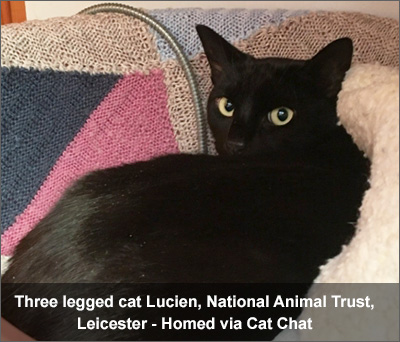 Cats usually find ways to adapt and live happy lives with three legs. They are more likely to experience distress from the incident or illness which resulted in amputation, rather than the physical change. It is essential however, for owners to help their cat to cope with this new situation at first, and then to consider the cats needs, long term.
Cats usually find ways to adapt and live happy lives with three legs. They are more likely to experience distress from the incident or illness which resulted in amputation, rather than the physical change. It is essential however, for owners to help their cat to cope with this new situation at first, and then to consider the cats needs, long term.
Assisting a Three Legged Cat:
• Initially, provide a step to get onto the bed / sofa until muscle tone and confidence improves.
• The litter tray may be a problem, but gradually, the cat will relearn and adjust.
• Washing after using the tray could be difficult at first, requiring help by the owner. However, as balance improves, normal grooming and cleaning will resume.
• Diet control is important, as being overweight will put extra strain on their remaining legs.
• For amputee cats that are to be allowed outside, ensure they have quick access to safety if needed.
• A three-legged cat should not be allowed outside until it has the balance, stamina and ability to get to safety. The cat will need to develop muscles and new levels of co-ordination. Alternatively, a fully enclosed garden or secure run might be a consideration.
Most important, don't worry... In time, you will be surprised just how agile a three-legged cat can be!!
If you could adopt a 3-legged cat, ask here: Find your Local Cat Rehoming Organisations
Further care information here: Amputee Cats (International Cat Care)
"Three legged or sight impaired cats adapt very well with time, but initially they need a patient owner to help them adapt to their environment." Cat Chat Veterinary Advisor.
Blind & One-eyed Cats
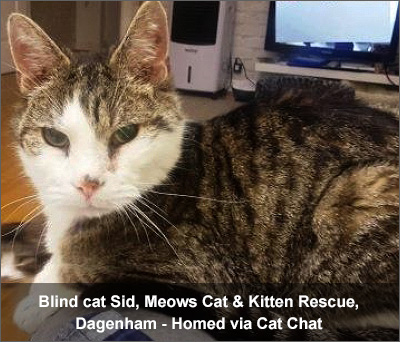 Just like humans, cats can suffer from blindness - in one or both eyes. This could have been from birth, or from other causes such as age-related degeneration of the eyes, illness, injury or untreated eye infections.
Just like humans, cats can suffer from blindness - in one or both eyes. This could have been from birth, or from other causes such as age-related degeneration of the eyes, illness, injury or untreated eye infections.
While there are certainly some things sight impaired cats may be unable to do, most of the activities that are important to them are still possible with a little thought and understanding from their human companions.
For a blind cat, their other senses are much more important, so be sure to talk to him more, and interract with lots of playtimes and cuddles.
Considerations for Sight Impared Cats:
• Furniture and daily essentials such as food, water and litter trays should be kept in the same position, and made easily accessible.
• Choose toys that crinkle or squeak, rather than sight-dependent toys.
• Talk to your blind cat as you approach, to avoid startling him. Approach one-eyed cats from their sighted side.
• Children should be told not to make sudden loud noises near the cat, and also to tidy any toys away, keeping floors clear.
• Blind cats should either live indoors, or alternatively, a fully enclosed garden or secure run would be needed to keep them safe from dangers.
• If your blind cat lives indoors-only, check out our blog - Keeping your Cat Entertained Indoors
In a stable environment, blind cats can adapt extremely well, using their whiskers and incredible sense of smell and hearing, to compensate for their lack of sight.
If you could adopt a blind cat, ask here: Find your Local Cat Rehoming Organisations
Further care information here: Cat Chat Blog - Living with a Blind Cat
"Blind cats do find it harder certainly, but keeping everything in its place at home will help. These cats will need slower introduction into their new homes." Cat Chat Veterinary Advisor.
Deaf Cats
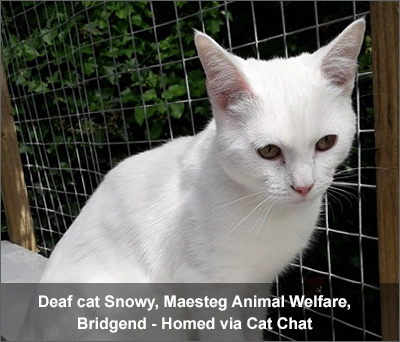 Quite often, white cats with one or two blue eyes are also deaf. In such cases, the deafness is usually inherited from birth. Sudden or gradual hearing loss can also result from illness, injury, or just old age.
Quite often, white cats with one or two blue eyes are also deaf. In such cases, the deafness is usually inherited from birth. Sudden or gradual hearing loss can also result from illness, injury, or just old age.
It is sometimes difficult to determine when a cat has hearing loss, although signs may include: failure to respond to you, being easily startled, disorientation, no longer being afraid of loud noises, head shaking or ear clawing, or if their miaow becomes louder.
Deaf cats rely on their remaining senses which become heightened. He or she will use vibration, touch and smell instead of sound to know what is going on around them.
Making Life Easier for Deaf Cats:
• Tapping on the floor, or walking heavily, will make the cat aware of your presence through the vibrations. Cats with partial hearing may respond to hand-claps.
• To rouse a sleeping deaf cat, gently touch the area around them, rather than touching the cat, to wake them without startling.
• Deaf cats still enjoy playtime with toys, and climbing activities for stimulation.
• Deaf cats should either live indoors, or alternatively, a fully enclosed garden, a secure run or a home well away from roads would be needed, as their lack of hearing could leave them vulnerable to danger.
• If your deaf cat lives indoors-only, check out our blog - Keeping your Cat Entertained Indoors.
Deaf cats can have a normal quality of life, and give just as much love and pleasure as those with full hearing.
Further information can be found on our Cat Chat blog - Help your deaf cat thrive
If you could adopt a deaf cat, ask here: Find your Local Cat Rehoming Organisations
Cerebellar Hypoplasia Cats
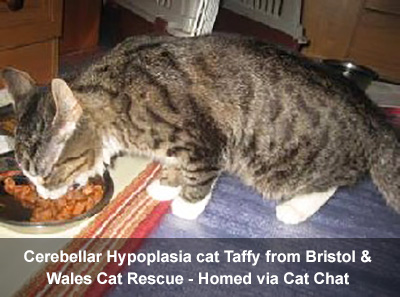 Cerebellar hypoplasia is a neurological condition resulting from an underdeveloped brain at birth. The part of the brain affected is that which controls balance and coordination, leading to unsteady movement.
Cerebellar hypoplasia is a neurological condition resulting from an underdeveloped brain at birth. The part of the brain affected is that which controls balance and coordination, leading to unsteady movement.
Most Cats with Cerebellar hypoplasia have a general lack of balance, a high stepping / prancing gait and are prone to falling over. Those affected are often referred to as ‘wobbly' kittens / cats.
Help for Cats with Cerebellar Hypoplasia:
• A litter tray with high sides offers more support for balance when toileting (do of course ensure the cat can get in and out ok).
• In cases of messy eaters, feed in an easily cleaned space.
• Use a sturdy water bowl that isn’t easily tipped up, and for some cats, a slightly raised bowl can help.
• Provide easy access to their favourite areas and a ramp covered in carpet, to access high surfaces.
• Cushions and rugs under windowsills make great crash mats!
• A secure, fenced garden or run will be needed if the cat is to go outside.
'Wobbly' cats can flourish in the right home. Their intelligence is normal, their condition gives them no pain, and they can live long and healthy lives. They enjoy fuss and comfort as do other cats, and have lots of love to reward their humans with. To find out more, visit our 'Wobbly Cats - What is Cerebellar Hypoplasia?' blog.
If you could adopt a CH cat, ask at your local cat rehoming organisations.
Arthritic Cats
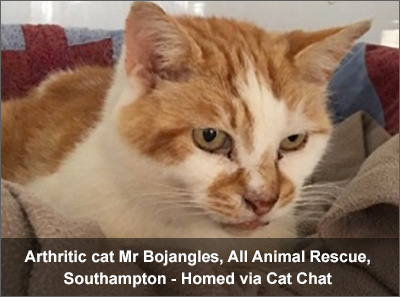 Arthritis is mostly found in mature cats over seven years of age. Signs of arthritis in cats can include them becoming less agile, reduced activity, altered grooming behaviour, difficulty finding a comfortable sleeping position, or a change in temperament.
Arthritis is mostly found in mature cats over seven years of age. Signs of arthritis in cats can include them becoming less agile, reduced activity, altered grooming behaviour, difficulty finding a comfortable sleeping position, or a change in temperament.
Once arthritis is diagnosed, there are a number of treatment options available, to help keep your cat comfortable and pain-free. Here are some simple things you can do to make life easier for the arthritic puss...
Simple Ways to Help Cats with Arthritis:
• Provide steps or a ramp to allow easy access to favourite high spots, such as the sofa or windowsill.
• Make sure the cat flap is easy to open. If necessary tie it open so the cat doesn’t need to push.
• Always have a litter tray inside, which has at least one low side for easy access.
• Make food and water easily accessible, ensuring the cat doesn't have to go up or down stairs for it.
• Groom and clean arthritic cats regularly, as they may have difficulty with this.
• Keep a comfortable cat bed in an easily accessible, quiet, warm, draft free location.
Adopting an older cat, with all the love and companionship they can provide, far outweighs any extra care needed to cope with arthritis, and other age-related conditions. Read more on our blog post Living With an Arthritic Cat.
More information on feline arthritis here: Cats Protection Vets Guide - Arthritis (PDF)
If you could adopt an older cat, ask here: Find your Local Cat Rehoming Organisations
Read our Top 10 Reasons to Adopt an Older Cat
Please Consider Adopting a Disabled Cat!
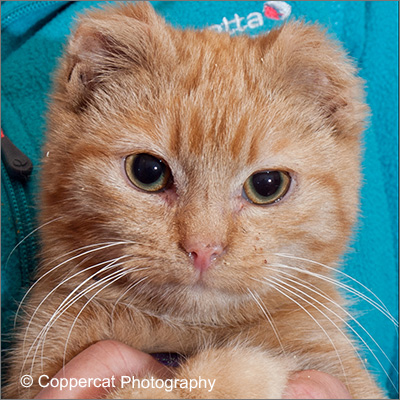 Although we have only scratched the surface of feline disabilities and health conditions, hopefully this page has given some insight and inspired further consideration. Understanding their needs can transform feelings of fear and apprehension into positivity and open mindedness, and lets face it, disabled cats need all the open minded, positive human friends they can get!
Although we have only scratched the surface of feline disabilities and health conditions, hopefully this page has given some insight and inspired further consideration. Understanding their needs can transform feelings of fear and apprehension into positivity and open mindedness, and lets face it, disabled cats need all the open minded, positive human friends they can get!
See the links below for extra information and advice. It may also help to talk to your vet if you are thinking of giving a disabled cat the chance of a loving home.
Ask at your local rescue centre or rehoming group about adopting a disabled cat. It could be one of the best and most rewarding choices you ever make. Could you adopt... and adapt?
Disabled cats are often featured on our 'Overlooked' Cats seeking a home section.
"It was a ‘dis-ability’ that drew my attention to my first cat. What caught my attention was the different coloured eyes. I was told she had very limited sight in the eye, possibly due to an injury. Xena soon came home with me, and we lived together for 10 years. Her eye issue was not a problem. Indeed, it gave her a quirky head movement - like an owl - as she studied objects and gauged distances. One truly affectionate cat and a real bundle of energetic fun!" Bryan, Cat Chat Volunteer
Extra Advice and Support Available
International Cat Care - Health Conditions
Vet Help Direct (like NHS Direct for animals) - Vet Help Direct
Cats Protection Veterinary Guide - Cats with Disabilities (PDF)
Cat Chat Vet Advisor - Email: This email address is being protected from spambots. You need JavaScript enabled to view it.
Pet Health & Care - Advice Websites
Why Rescue? (and not to buy): Why Adoption is the Best Option
Where to Rescue? Cat Rehoming Centres UK & Ireland


